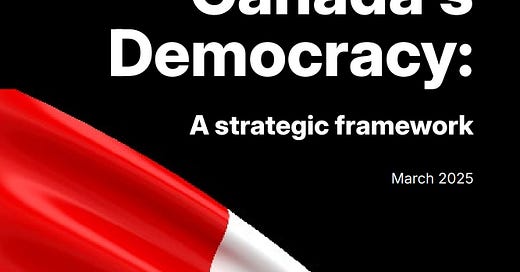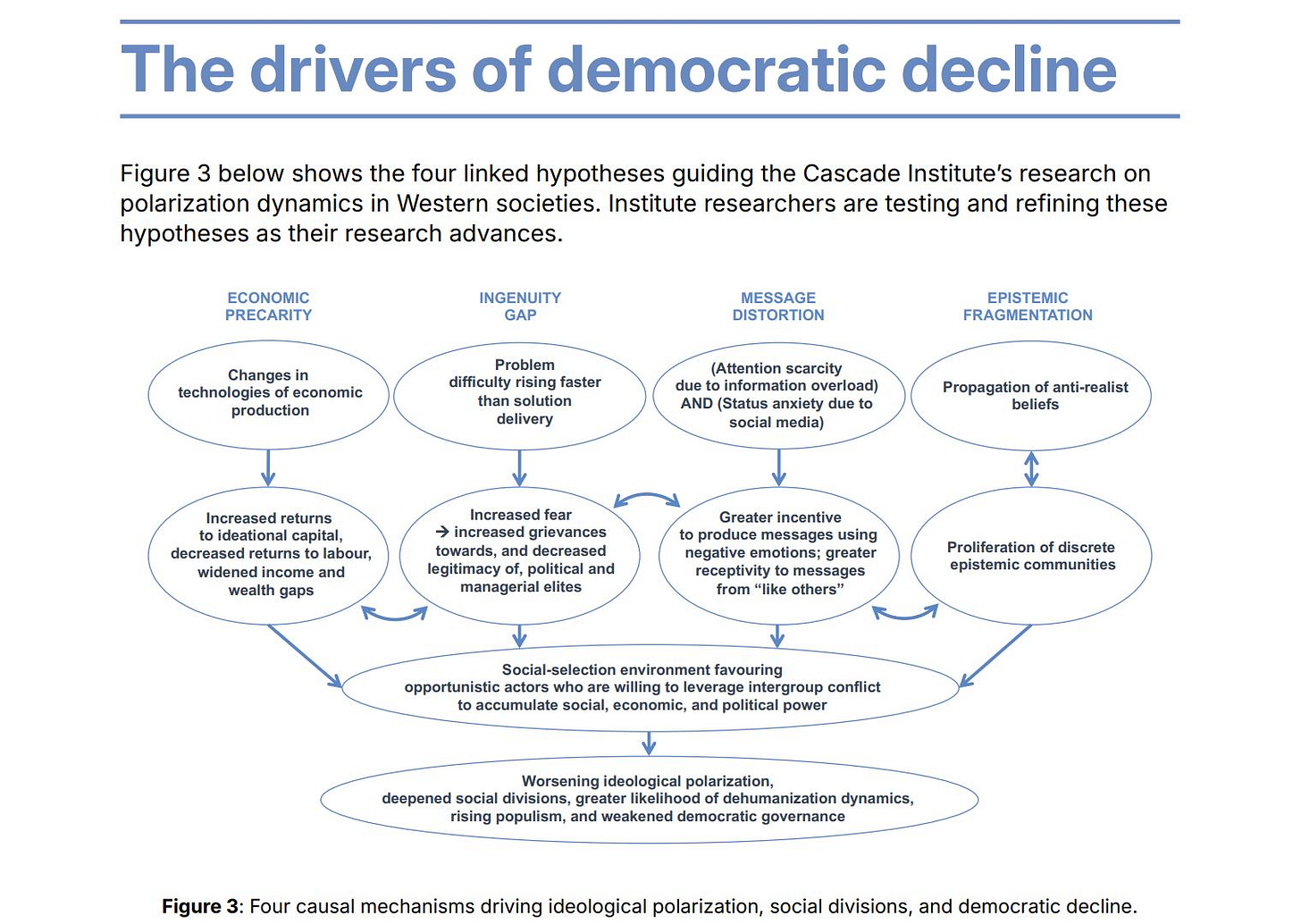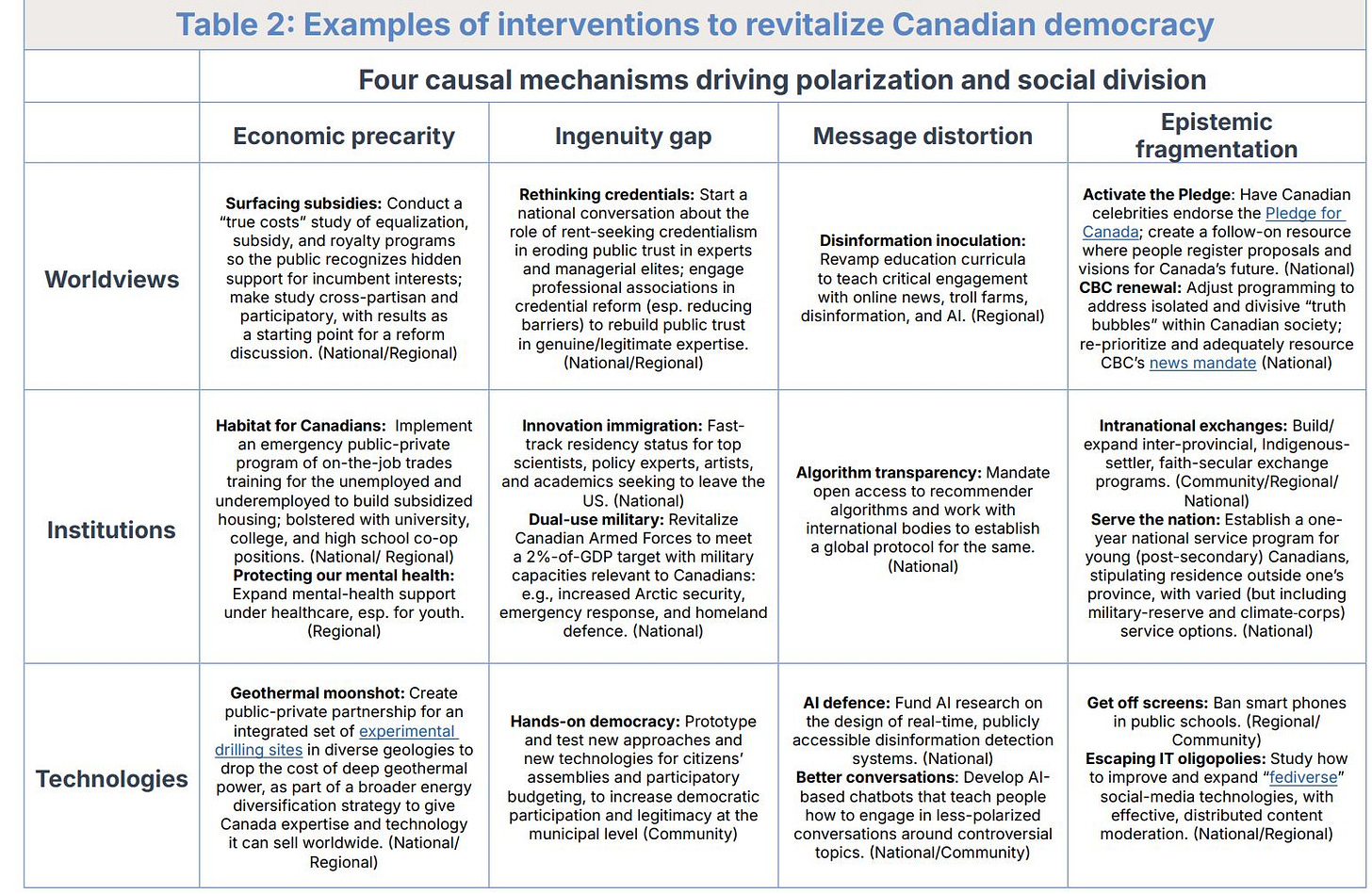What must we do? Defending Canada's democracy
Que devons-nous faire ? Défendre la démocratie canadienne
Common introduction to each post in the “CANADA’S FUTURE,” “What must we do?” series of posts
On March 8, the Pledge emailed via Substack its first newsletter (called “Canada’s Future”) to the full list of supporters of the Pledge who also opted in to email updates (70,000 of you in total, at present). That newsletter is simultaneously a “post” (or, “article”) also called “Canada’s Future,” located on this Pledge website on Substack.
The “Canada’s Future” newsletter-article set out some observations and arguments about this historical moment in which we find ourselves and then asks Pledge supporters to engage on the Pledge’s Substack platform about what we must do to secure our future, to secure a Canada we want:
Make no mistake, Canadians will build a better Canada. There’s no shortage of ideas. What’s needed is a grand and diverse coalition of Canadians ready to do their part and to push their governments to work together and rise to the challenge.
We are including for your consideration several articles that try to sketch out an agenda for a less dependent, more resilient and just Canada. There is some overlap, some disagreement, some gaps [amongst theme].
Clicking on any given link [found in the “Canada’s Future” article] takes you to a post on the Pledge’s website…. From there, you can link to further information. The purpose is to launch a conversation amongst Pledge supporters.
You can comment/reply to posts by clicking on an icon that resembles a cartoon speech bubble at both the top and bottom of the post. You may choose to comment, and thereby participate in online dialogue, on any or all of the linked posts below.
This is one of six posts that connect back to the “Canada’s Future” newsletter/article.
Please consider participating!
As explained in the “Canada’s Future” post, clicking on the speech bubble icon at the top and bottom of the post is how you can make a comment. You can then reply to others’ comments. Please try to abide by two principles as expressed in Substack’s community guidelines for publications like the Pledge. They are expressed as applying to “writers” but the Pledge extends that notion to everyone commenting in threads on Pledge articles/posts.
1. Be kind to each other. Substack is founded on the belief that writers and their work deserve respect. Keep conversations civil in the comments of this publication and other Substack community spaces, such as events. Respect one other’s perspectives and life experiences in your conversations, and refrain from cruel or derogatory language.
2. Stay on-topic. We want this publication to support thoughtful discussion around writers’ work. It is not a place for irrelevant rants or off-topic digressions. That includes spam and repetitive self-promotion.
Defending Canada’s Democracy: an invitation to discuss this post’s themes with other Pledge supporters
This post’s theme is democracy in relation to threats to the democracy we have now from forces like social polarization, disinformation, and so on. Future posts are likely to focus on democracy in a more proactive way to dig into the general question of what is required for a more robust democracy beyond the measures addressed in this post.
The Cascade Institute is a Canadian research centre addressing urgent and entangled global problems. It anticipates future crises and identifies high-leverage interventions to change humanity's course for the better.
A compact 12-page report has just been published (March 2025) by the Institute called Defending Canada’s Democracy: A strategic framework. The Institute provides this overview:
The Cascade Institute offers here a strategic framework to revitalize and defend Canada’s democracy.
The problems facing Canada—and weakening our democracy—are so varied and entangled that it’s difficult to know where or how to start fixing them. This framework therefore uses an analysis of the deep causes of our democracy’s current frailty to help Canadians identify powerful ways to build our country’s economic and social resilience. It’s explicitly strategic, in that it shows how these initiatives can be integrated with worthwhile ideas already circulating to create a cohesive and synergistic action plan.
The Cascade Institute will apply this framework to guide and focus the now urgent
conversations—within governments, among policymakers and businesses, and across Canada’s civil society—about how to save our country.
The framework is outlined:
The Cascade Institute uses two analytical tools to identify where and how Canadians can start addressing the forces weakening Canada’s democracy.
The first is WIT analysis. This analysis assumes that societies are organized around cohesive clusters of Worldviews, Institutions, and Technologies, or “WIT sets.” Effective interventions to shift a society’s direction or to respond to critical threats must address all three WIT elements simultaneously.
The second tool is a comprehensive analysis of ideological polarization, social division, populism, and democratic decline in Canada, the US, and other western societies.
The Cascade Institute proposes, as a working hypothesis, that four causal mechanisms are driving these pernicious social outcomes; research indicates all four mechanisms are operating powerfully today. They are:
• Economic Precarity: Changes in production technologies are widening income and wealth differentials and increasing economic insecurity.
• Ingenuity Gap: Failures in social problem solving are delegitimizing political and managerial elites.
• Message Distortion: Information overload and social media are interacting to increase the divisiveness of social messaging.
• Epistemic Fragmentation: Propagation of anti-realist beliefs is aiding proliferation of alternative “truth bubbles.”
The report depicts these four mechanisms and their interactions in a figure. Like all such graphics, don’t be scared off by the initial impression of looking at the whole and thinking it is too complex. We suggest you digest it methodically, reading each ‘column’ of circles from left to right.
The report ends with a table summarizing twelve groups of actions the Institute recommends for revitalizing democracy. Because of the breadth of the table, it is easiest to look at the report online and read the table there (at p.14) but we reproduce it below for a handy reminder when commenting and discussing:
Do you think social polarization and division are at the heart of threats to Canadian democracy and, if so, are you inclined to think of one or two of the causal mechanisms driving polarization and division as most important in effects and most important in the urgency to address?
Which of the suggested interventions do you feel should be prioritized?
Are there things this framework misses or does not get right, in your view?
In thinking about “defending democracy in Canada”, consider also looking at the post on “Authoritarian onslaught in the US.” Does what is happening in the US help clarify what we should be most concerned about and what we should do to address our deepest concerns?
Addition on March 16, 2025:
We add two new documents on the descent into authoritarianism and on the knock-on impacts for US aggression against Canada. The first is the March 16 substack newsletter of Yale professor Tim Snyder, mentioned and linked to in our March 17 newsletter — see the Snyder piece here. The second is briefing by Professor Ron Deibert to the staff of the United States’ Senate Select Committee on Intelligence, reproduced in the Globe and Mail. As the Globe is paywalled, it is reproduced below.
The United States is putting the United States in danger
Ron Deibert
Special to The Globe and Mail
Published March 14, 2025
Ron Deibert is the director of the University of Toronto’s Citizen Lab and the author of Chasing Shadows: Cyber Espionage, Subversion and the Global Fight for Democracy. These comments are an edited version of a briefing he delivered to staff of the U.S. Senate Select Committee on Intelligence on March 5, 2025.
Recently, I was asked to brief members and staff of the U.S. Senate Select Committee on Intelligence about the Citizen Lab’s research on mercenary surveillance. In normal times, such a briefing would be an honour. But these are not normal times.
The invitation came as the U.S. President threatens to annex my country, repeatedly, regardless of the fact that Canadians have been America’s most trusted ally for decades, and part of the most successful intelligence partnership the world has ever known, separated for centuries by the world’s longest demilitarized border.
My father was a Second World War veteran who volunteered to fight fascism overseas. Two and a half years ago, I was appointed an officer in the Order of Canada, the country’s second-highest civilian honour of merit. I take that honour very seriously, and I take the threats to my country’s security and sovereignty extremely seriously, too. Rather than decline the invitation, however, I decided to give the Senate committee some real talk about the looming national security risks that are bearing down on their own country, by their own government’s hands.
It’s apparent to almost everyone the world over that the United States is rapidly descending into authoritarianism. We are observing routine attacks on democratic institutions, the undermining of the rule of law, daily assaults on the press, politicization of government agencies (including intelligence and law enforcement agencies), the encouragement of political violence, the deliberate evisceration of formal checks and balances, and outright corruption and self-enrichment.
As these practices become normalized in the United States, they will have major consequences for security worldwide, including, ironically, in the United States.
We are observing the sudden withdrawal of U.S. support for civil society organizations, a major pillar of liberal democracy and human rights worldwide. This hollowing-out of an entire community of organizations is self-defeating. Not only do these organizations spread important American values, like human rights and political liberty, they can be instrumental in surfacing threats to U.S. national security. For example, recent spyware abuse investigations that the Citizen Lab undertook that led to discoveries that U.S. officials were being targeted flowed from vigilant civil society groups funded in part by the U.S. government itself. Now, the rug has been pulled out from under them. Worse, we are seeing civil society organizations, defunded by the U.S., investigated by autocratic governments in the countries where they are based. That scenario will play itself out repeatedly wherever NGOs are left hung out to dry. That’s how norms of repression spread.
U.S. actions to undermine the rule of law, politicize intelligence and undercut civil society will legitimize similar actions by dictators and despots the world over. The vacuum being created by the elimination of anti-corruption efforts will further kleptocracy. This will in turn embolden oligarchs and autocrats to procure highly specialized surveillance tools from an unregulated mercenary marketplace, and then reach across borders to target whomever they see as a threat. Inevitably, that will include U.S. citizens and government officials. And yet, highly qualified personnel working for law enforcement and intelligence agencies whose job it is to protect Americans are being cut down by Elon Musk’s chainsaw.
Meanwhile, the Trump administration’s disturbing attacks on its allies are undercutting the very global community of like-minded countries that the U.S. has itself benefitted from as a force multiplier for decades. Take Canada: how can a country being threatened with annexation be expected to co-operate on intelligence-sharing, or to counter the proliferation of dangerous cyber tools, or tackle terrorism, when its former partner is now its greatest existential risk? Canada is not alone. Many of the U.S.’s other allies now see it as an agent of chaos and a source of unpredictable and extremely belligerent threats. As it alienates itself from all but a few like-minded dictators, U.S. government actions will leave huge gaps in its ability to see threats emerging abroad before they materialize, effectively cutting off its ears and eyes on the ground.
The U.S. Senate Select Committee on Intelligence has a formal responsibility to act as an oversight body over intelligence agencies, and in the past it has played an important role exposing abuses of power. If such Congressional committees genuinely lived up to their mission, they would be doing whatever they could to urgently check America’s dystopian descent into cruel technofascism. These are not normal times, after all – and failing to stand up would bring about the country’s ruin.






I do agree that polarization is one of the big problems. Message distortion, epistemic fragmentation, and economic precarity are the top three reasons I would pick. I like the solution described under Habitat for Canadians and Disinformation Inoculation. There my be limits to what we can control on the outside but if people are informed and educated, they can better analyze what is thrown at them. I've thought it would be good to combine humanities and/or history and/or some kind of liberal arts with the trades so we all have a better understanding no matter what field we go into. The long game is education which will produce educated voters. Also, I'd like to know what guardrails Canada has with respect to separated powers and ethics rules and enforcements within our courts. We've seen what's happened in the States with legal corruption. What laws does Canada have and where can they be strengthened? Also, let's change how we discuss the word, regulations, and substitute the word, protections.
At the end of the post, we just added references and links to two new documents on the descent into authoritarianism and on the knock-on impacts for US aggression against Canada. The first is the March 16 substack newsletter of Yale professor Tim Snyder, mentioned and linked to in our March 17 newsletter. The second is briefing by Professor Ron Deibert to the staff of the United States’ Senate Select Committee on Intelligence, reproduced in the Globe and Mail and also with the text reproduced at the end of the post.